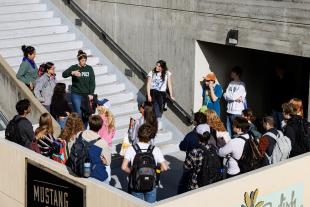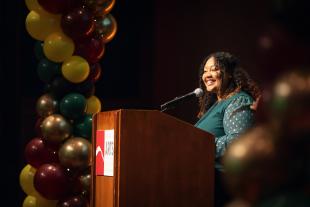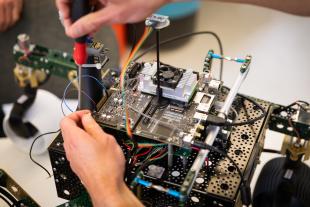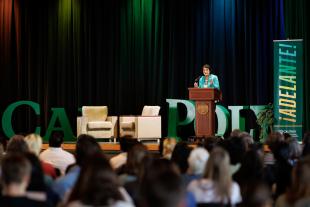‘Making Sure They Can Thrive.’ 17th PolyCultural Weekend Reaches Future Students Virtually
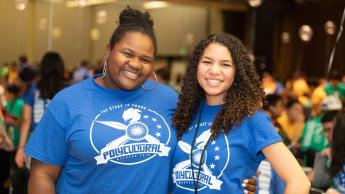
Photos in this article reflect the 2019 PolyCultural Weekend event.
For more than 15 years, PolyCultural Weekend has helped future students feel more at home on Cal Poly’s campus months before they start their first quarter.
The student-led event gives prospective Mustangs from underrepresented backgrounds — which include factors such as race and ethnicity, gender, and socioeconomic status — a chance to spend three days on campus and have a 360-degree experience of what it’s like to be part of Cal Poly.
On April 2 and 3, PolyCultural Weekend organizers are preparing to meet students and supporters in a moment unlike any other. Like most major events at Cal Poly over the past year, this year’s program will be virtual.
But organizers say this year’s event feels different — and not just because of technology. After a year that illustrated the institutional racism and societal inequalities nationwide that cause special harm to communities of color, PolyCultural Weekend is an opportunity to show prospective students from marginalized backgrounds that they can feel confident in choosing Cal Poly.
“It's about centering diversity, equity and inclusion together so that a diverse student population can see themselves here, living here and thriving here,” says Beya Makekau, director of Student Diversity and Belonging.
Under normal circumstances, 300 accepted students spend three days experiencing Cal Poly firsthand, paired with a current student, called a host, who’s active in cultural organizations and serves as their mentor. Students make connections at a vibrant club showcase, dig into cuisine at local restaurants, and marvel at “PCW’s Got Talent,” an energetic performance showcase featuring culturally-rooted music, dancing and sorority and fraternity salutes.
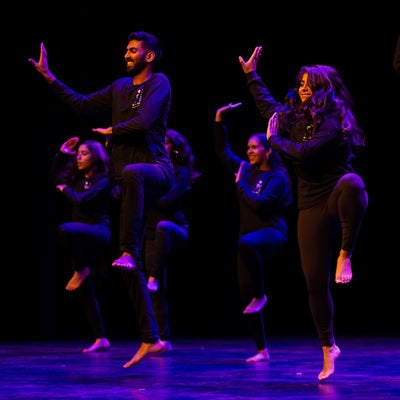
The 2020 event became part of Cal Poly’s virtual Open House experience, and PolyCultural Weekend’s planning team focused on making 2021 special.
“We had the whole year to plan and to really be able to re-imagine what this event could look like,” said Lilianne Tang, who oversees the event alongside a team of dedicated student leaders. “I think that got the coordinators really excited and their creative juices flowing.”
In addition to live Zoom events, participants will chat using Discord, an informal messaging app popular with gamers. Organizers are also trying to close caption virtual presentations for greater accessibility. Video blogs will walk viewers through diverse culinary options around the Central Coast. Cultural organizations on campus will prerecord their music and dance performances for a virtual celebration. Hundreds of hosts are already prepared to mentor attendees, and more than 35 cultural clubs and organizations are signed up to participate — a new record for the event.
Mentorship will remain central to the event, say organizers. Hosts will virtually mentor a small group of accepted students to build more connection among participants. Transparent conversations about the university’s past, present and future are critical for many accepted students as they consider a Cal Poly education.
“We tell the hosts to be honest, speak their experiences freely and not to sugarcoat anything,” says Tisa Tehranchi, a public health student and leader of the event’s Connections Committee. “But with that, we often ask them to share also how the campus can come together, how the cultural community becomes stronger during times of turmoil, and how there's often room for growth.”
Many of the 300 students who lead and orchestrate PolyCultural Weekend attended as prospective students themselves. Their perspective continues to shape some of the enduring components of the event as it makes the virtual transition.
“I'm excited for the student panel because I know when I was a hostee, I wanted to hear firsthand experiences from students, especially coming into a predominantly white institution,” says Lizbeth Guzmán Villanueva, an industrial engineering student and leader of the event’s Hype Committee.
“That was one of the things that really helped me to solidify that I did want to attend to Cal Poly, because I saw how resilient the cultural community on campus was. I felt that I could really find my community here.”
The result, says Makekau, is community pride and a deep sense of belonging at Cal Poly.
“It’s easy to feel like you don't matter. We want to reverse that — we want to show them that there is a community of people that care about [them],” Tehranchi says of the event’s core message for prospects and supporters. “[We hope] they know that people care about them — we care significantly.”
Leaders want the experience to help attendees accept their offer of admission and connect to a continuum of programs that center culture, identity and equity throughout their experience. Those include Week of Welcome’s Cross Cultural Experience, the learning communities in University Housing, the Multicultural Center’s Poly Pipeline Mentorship Program, and dozens of cultural and religious organizations throughout the university.
Amber Lin, a business student and leader of PolyCultural Weekend’s Lifestyle Committee, says the weekend helped her make friends and find a club she was passionate about: the Chinese Students’ Association. It all started with her host.
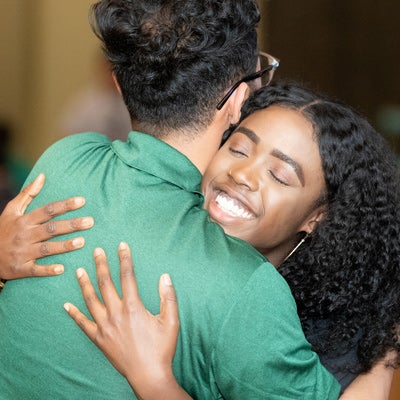
“My host helped me a lot because I didn't know a lot of business majors,” Lin says. “She introduced me to the Multicultural Business Program. I remember she would always text me, and if I had any questions about choosing my concentration, she would help me out.”
But the magic of the PolyCultural Weekend experience isn’t limited to prospective students. Leaders understand that it also gives students of color who are already at Cal Poly a valuable opportunity to inspire one another while building community with the next class of Mustangs.
“One thing that really influenced me was [seeing] this past year's coordinators,” said Andru O’Hara, animal science student and Media Committee lead. “Seeing them in this leadership role really inspired me personally to pursue it because those are people that I could relate to more.”
That factor highlights the long-term value of PolyCultural Weekend — not just attracting students from underrepresented backgrounds, but supporting them and connecting them to the campus community throughout their time at Cal Poly.
“It’s not just about getting them here,” says Makekau. “It's about getting them here and making sure that they can thrive and that they're going to be successful: that they're going to graduate.”
For more information on PolyCultural Weekend and the event’s rich history, visit the Multicultural Center’s website.

